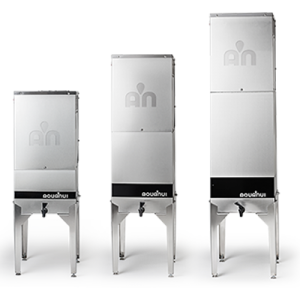Distilled Water to Make Ice:
Distilled water is the water of choice for making ice cubes because of its extreme purity. The result is ice that is clearer and harder than ice made with water that has impurities in it. It is the impurities frozen into ice that give it, its cloudy appearance. This is particularly unappetizing when cloudy ice cubes are seen melting in a glass of water…white gunky stuff slowly drifting to the bottom of the glass! It is even more disturbing when cloudy ice cubes are used to cool a glass of distilled water! Using softened water to make ice will result in ice cubes that are reasonably clear but they will have sodium ions trapped in them.
The freezing point of distilled water is right at 0 degrees Celsius (32 degrees Fahrenheit). When there are impurities in water, the freezing point is lower (and the boiling point is higher). That is why using distilled water to make ice is slightly quicker, thus saving a bit of energy.
When distilled water is used in the automatic type ice maker found in today’s refrigerators, there is another huge advantage. The tubing in the ice maker does not get plugged with hardness minerals. This should result in an ice maker that will last substantially longer than one that is being fed with tap water.
Using distilled water to make ice is slightly quicker, thus saving a bit of energy
Distilled Water in Rinsing:

Distilled water is the ideal choice to use when washing residue from fresh fruits and vegetables. Adding a little peroxide to the distilled water will make it an effective and safe disinfectant to use for destroying bacteria on the surface of raw chicken or fish.
Distilled Water in Baking:
Another great use for distilled water in the kitchen if for baking…cakes, pastry, breads etc. Those baked items that have a rising agent (yeast or baking soda) will rise a bit faster and be slightly more light and fluffy than the same recipe using tap water, especially if it contains chlorine. Naturally there is also added peace of mind, knowing that these baked goods do not have the impurities found in tap water.
Distilled Water in Cooking and more……
 When cooking or steaming fresh vegetables, the colors are somewhat brighter when distilled water is used. Besides being more healthful, foods that use a great deal of water in their preparation, such as rice, noodles and other pastas will be less likely to clump together, jello will be more shimmery…..when made with distilled water. Distilled water should also be used when canning fruits and vegetables. It is not only the healthy thing to do but this will also lead to fewer lid sealing problems and food spoilage problems down the road.
When cooking or steaming fresh vegetables, the colors are somewhat brighter when distilled water is used. Besides being more healthful, foods that use a great deal of water in their preparation, such as rice, noodles and other pastas will be less likely to clump together, jello will be more shimmery…..when made with distilled water. Distilled water should also be used when canning fruits and vegetables. It is not only the healthy thing to do but this will also lead to fewer lid sealing problems and food spoilage problems down the road.
 Naturally it is a huge benefit to use distilled water for coffee, hot or iced tea, reconstituting frozen fruit and vegetable concentrates. Most people find that they can use about 1/3 less coffee grounds or instant tea when using distilled water for the same rich flavor. It is also possible to add an extra can of water than the directions say, when reconstituting concentrates for the same fresh flavor.
Naturally it is a huge benefit to use distilled water for coffee, hot or iced tea, reconstituting frozen fruit and vegetable concentrates. Most people find that they can use about 1/3 less coffee grounds or instant tea when using distilled water for the same rich flavor. It is also possible to add an extra can of water than the directions say, when reconstituting concentrates for the same fresh flavor.
In Conclusion, It has always been the position of Pure & Secure that the human body needs pure, contaminant-free water to function at its peak. Especially when it comes to the way you drink your coffee, you masterfully prepare your food, or enjoy your cocktail drink. Your water treatment equipment should not remove some of the contaminants in water that can be harmful to those who drink it, they should be able to eliminate the contaminants. Our products mimic the Hydrologic Cycle and, unlike water filtration methods, our steam-distillation technology returns water back to its pure origin. Don’t you want the best protection for your family? Start custom designing your AquaNui distiller today.
